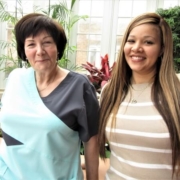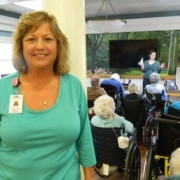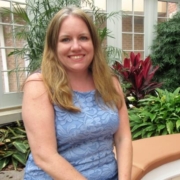Infection control at Homeland: Strict attention to safety without disrupting quality of life
 When a housekeeper suggested to Homeland’s Infection Preventionist Emile Shumbusho that the clock in Homeland Center’s Main Gathering Room would be a good, centralized place for a hand sanitizer station, he readily agreed.
When a housekeeper suggested to Homeland’s Infection Preventionist Emile Shumbusho that the clock in Homeland Center’s Main Gathering Room would be a good, centralized place for a hand sanitizer station, he readily agreed.
“That’s a fantastic idea,” he told the housekeeper. “Let’s do it right away.”
Teamwork, agility, and communications have long been Homeland’s strength, and it has paid dividends as Shumbusho and the entire staff work to maintain sustained infection control during the COVID-19 pandemic.
Shumbusho, who joined Homeland in October 2020, was a physician in his native country Rwanda. It was a role that fulfilled a dream born in childhood when he wanted to help people in his war-torn country.

Emile, son and wife Diane
When he came to the U.S. to join his then-fiancée, an Army obstetrician-gynecologist who is now his wife, he shifted into infection control after finding it difficult to get into medical practice. He sees the field as fascinating for its power to combine medical knowledge with operational improvements designed to keep people safe.
“I’ve been impressed by the dedication of staff and the professionalism of leadership,’’ Shumbusho says of Homeland. “People are not just colleagues. They are trying to help and be good neighbors.”
From the beginning of the pandemic, Barry Ramper II, Homeland’s president and CEO, urged the team to do their best without worrying about monetary cost.
“That is a rare statement in health care – really rare,” says Shumbusho. “Putting the residents first, understanding the concerns for the residents, making sure that residents and staff are safe – it’s about adjusting to change.”
Having a dedicated role for infection control on staff ensures “undivided attention to complete that task,” he says. New federal and state infection prevention guidance mesh with Homeland’s existing precautions.
“You have to follow up and make sure every decision comes across,” says Shumbusho. “I feel like people comply when they understand the reason behind it. It’s just taking the extra step to make sure that people understand.“
“When we are in meetings or have a policy to implement, there are always two questions: Is this something we need to do, and how can we do it in a way that either improves or does not detract from the quality of life for our residents?’’ he says. “Making sure that every process centers on people’s quality of life is a lesson I carry with me.’’










